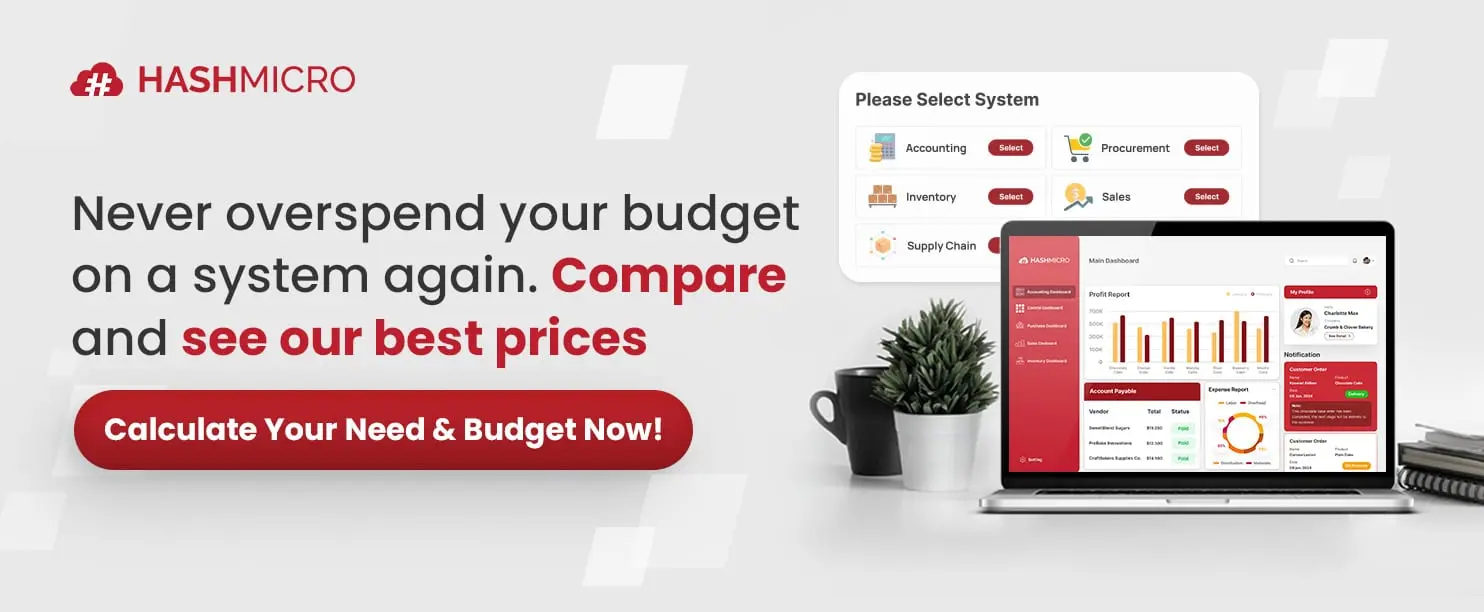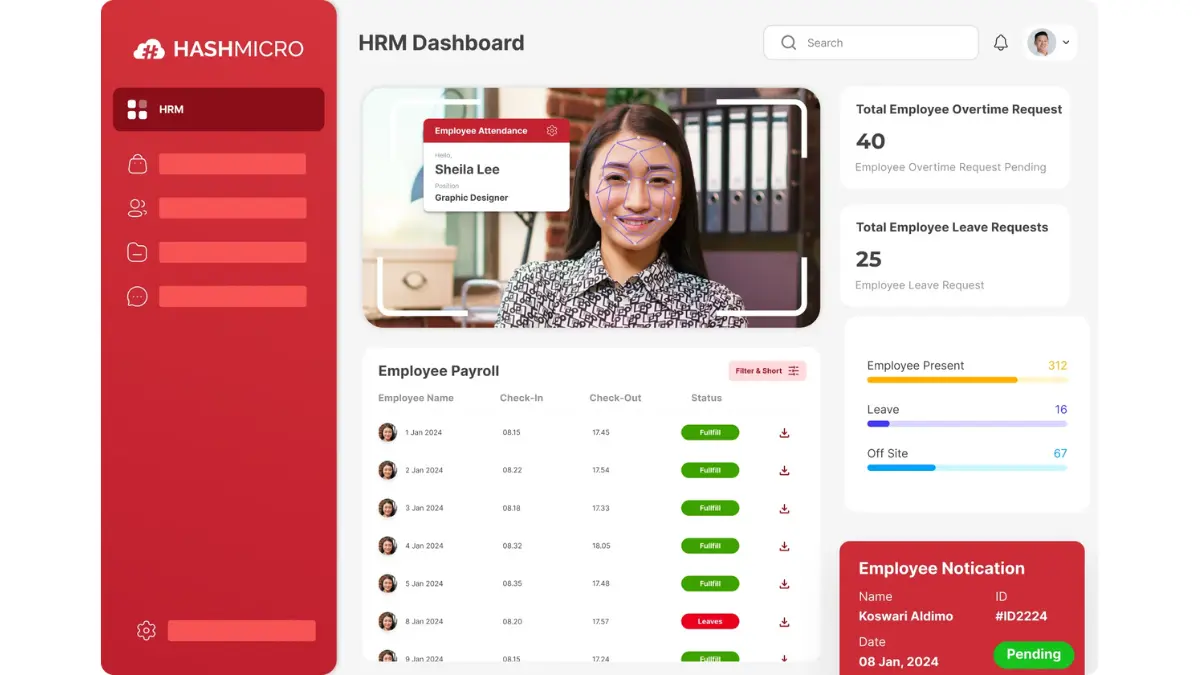As the job market evolves, employees are looking for more than just a paycheck. Today’s workforce values a comprehensive benefits package that includes everything from healthcare to flexible work arrangements, making employee benefits a key factor in recruitment and retention.
However, managing a diverse benefits program can be overwhelming for HR managers. From ensuring compliance with statutory requirements to tracking leave and managing payroll, the complexities can lead to inefficiencies and costly mistakes if not appropriately handled.
According to a survey by Hays Malaysia, nearly half of Malaysian employees are dissatisfied with their current benefits packages, emphasising the need for companies to revisit their offerings.
In this article, we’ll break down the essential employee benefits you should be offering, the common challenges in managing them, and you can also try our free demo to see how HashMicro’s HR software can simplify benefits administration to boost both HR efficiency and employee satisfaction.

Key Takeaways
|
What are Employee Benefits?
Employee benefits are a form of compensation provided by employers to their workers in addition to their regular salaries. These benefits can include essential offerings such as health insurance, retirement plans, paid leave, and various employee perks programs like gym memberships, mobile allowances, and free snacks at work.
In Malaysia, certain employee benefits, such as annual leave and sick leave, are mandated by the Employment Act 1955, ensuring that employees receive fundamental rights and protections. In addition to these mandatory benefits, companies often offer additional voluntary benefits designed to attract and retain top talent, such as flexible working hours or educational allowances.
The importance of employee benefits in Malaysia cannot be overstated, as they play a crucial role in enhancing employee satisfaction and overall organisational performance. By investing in a comprehensive workplace benefits program, companies can create a supportive environment that fosters loyalty, enhances productivity, and improves employee well-being, key elements for long-term success in today’s competitive job market.
Who is Entitled to Employee Benefits in Malaysia?
In Malaysia, employee benefits are a crucial component of the overall compensation package, governed by the Employment Act 1955 and various regulations. A strong employee value proposition that includes attractive benefits is essential for companies looking to stay competitive in the talent market.
The entitlement to these benefits largely depends on the type of employment and the employee’s status. Here is a breakdown of the different categories of employees who are entitled to employee benefits in Malaysia:
1. Permanent employees
Permanent employees are the backbone of most organizations, hired on an ongoing basis to work on tasks that are essential to the company’s operations. They are entitled to a full range of employee benefits, including statutory benefits such as annual leave, sick leave, maternity leave, and public holidays.
These employees also enjoy social security benefits like the Employees Provident Fund (EPF), Social Security Organization (SOCSO) contributions, and medical coverage under the company’s health insurance plan. Additionally, permanent employees may also benefit from an Employee Perks Program that includes bonuses, career development opportunities, and other workplace benefits programs.
2. Contract employees
Contract employees in Malaysia typically work for a specified period or on a project, with their benefits determined by the terms of their contract. While they are entitled to basic statutory benefits, such as EPF, SOCSO, and annual leave, their eligibility for additional benefits, including medical or retirement plans, may vary depending on the contract terms.
If the contract exceeds a specific period, employees may be eligible for a broader range of benefits, similar to those of permanent staff. Contract workers should ensure their rights are clearly outlined in their agreements to avoid any ambiguity regarding their employee benefits.
3. Part-time employees
Part-time employees typically work fewer hours than their full-time counterparts; however, they are still entitled to certain employee benefits based on the number of hours they work. In Malaysia, part-time workers are eligible for statutory benefits such as EPF and SOCSO contributions, provided they meet the required working hours threshold.
However, other benefits, such as paid leave, may be prorated depending on their contract and work schedule. Companies offering part-time positions should consider providing an employee benefits package that is both competitive and aligns with local labor laws to attract and retain talent.
4. Temporary and casual employees
Temporary or casual employees are hired for short-term projects or on an as-needed basis, often with no long-term commitment from the employer. These workers may be entitled to statutory benefits, such as EPF, SOCSO, and medical benefits, if their employment exceeds a specific duration, typically 30 days or more of continuous service.
Although they may not receive benefits such as paid annual leave or bonuses, companies can offer additional incentives or perks through an Employee Perks Program to ensure these workers feel valued and appreciated. Temporary employees must understand their entitlements to avoid confusion about their benefits during their employment period.
5. Probationary employees
Probationary employees are in a trial period, typically lasting between three to six months, to assess their suitability for permanent positions. During this probationary period, they are entitled to certain employee benefits, such as contributions to the Employees’ Provident Fund (EPF) and Social Security Organisation (SOCSO), along with maternity and sick leave, provided they meet the minimum working days requirement.
However, they may not be eligible for other benefits, like bonuses, until they transition to permanent employee status. Employers should ensure transparency and clarity regarding the benefits available to probationary employees as part of their workplace benefits program, thereby fostering goodwill and setting clear expectations.
Also read: ERP Software for Streamlined Employee Benefits Management.
Importance of Employee Benefits
Employee benefits are essential for businesses seeking to cultivate a motivated, satisfied, and productive workforce. Offering a competitive benefits package extends beyond attracting talent; it also helps retain employees and foster a positive work environment.
Here’s why employee perks matter in Malaysia:
1. Finding and retaining talent
Providing a well-rounded benefits package is one of the most effective ways to attract and retain top talent in a competitive job market. With many job seekers having a wide range of options, offering enticing employee benefits can make your company stand out.
Benefits such as flexible working hours, paid time off, and health insurance can reduce turnover and keep employees committed to your organization. By focusing on employee benefits, Malaysia can ensure that employees feel valued, ultimately creating a more loyal workforce.
2. Boosting employee morale
Employee morale is directly tied to the benefits they receive. When employees feel supported, they tend to be happier and more engaged in their work. Offering benefits such as health insurance, paid sick leave, and wellness programs can significantly enhance employee satisfaction.
When employees know their well-being is a priority for the company, they are more likely to remain motivated and loyal to the organization. In turn, this fosters a positive work environment that enhances overall productivity and reduces the risk of burnout.
3. Enhancing health and well-being
Many employee benefits, such as health insurance, gym memberships, and wellness programs, are designed to improve employees’ physical and mental well-being. When employees have access to resources that support their health, they are more likely to be productive and focused at work.
Healthy employees are not only happier but also more resilient, which reduces sick days and increases their overall contributions to the company. As health becomes a priority for workers, providing these benefits demonstrates a commitment to their well-being, ultimately leading to a healthier and more effective workforce.
4. Increasing productivity
There’s a strong link between employee benefits and productivity. Happy, healthy, and motivated employees tend to perform better and work more efficiently. Companies that offer benefits such as paid leave, healthcare, and professional development opportunities often experience an increase in both the quality and quantity of their employees’ work.
By investing in employee perks programs, businesses can foster a work environment where employees feel empowered to perform at their best, ultimately benefiting the company’s bottom line.
5. Meeting legal requirements
In Malaysia, certain employee benefits are required by law, including workers’ compensation and unemployment insurance. Failure to provide these mandatory benefits could result in legal consequences, as well as a negative impact on employee morale and retention.
Beyond legal requirements, offering a robust benefits package can help companies attract talent and ensure compliance with local labor laws. You can review our pricing scheme below to see how HashMicro can help prevent legal issues while fostering employee satisfaction.

Types of Employee Benefits in Malaysia
As employee needs evolve, organizations in Malaysia are offering a broader range of benefits to attract, retain, and support their workforce. Each category addresses different aspects of employees’ lives and contributes to a well-rounded workplace benefits program that enhances job satisfaction and overall well-being.
Let’s explore each type and the unique benefits it includes, along with some innovative advantages that extend beyond these categories.
1. Benefits at work
Benefits at work directly impact how employees experience their daily tasks and responsibilities. These include flexible working hours, skills development opportunities, and various workplace perks such as food, beverages, and gifts.
Employers are increasingly offering control over work schedules and locations, particularly with the rise of remote and hybrid work arrangements. By providing employees with more flexibility, companies can help create a more productive and satisfied workforce, thereby reducing stress and enhancing work-life balance.
a. Working hours and time off
Flexibility in working hours and time off has become increasingly crucial, especially in the post-pandemic era, as many employees now prefer remote and hybrid work arrangements. By offering schedule control, employers improve job satisfaction, work-life balance, and overall productivity.
b. Skills development
Continuous skills development is essential in an ever-changing work environment, enabling employees to stay relevant. Companies in Malaysia are increasingly investing in upskilling programs, particularly in technology, to enhance employee performance and foster long-term loyalty.
2. Benefits for health
Employee benefits for health are crucial to maintaining and improving both physical and mental well-being. These benefits typically include health insurance, gym memberships, and stress management programs. In Malaysia, there is a growing focus on mental health, with many companies offering counseling services, mental health days, or workshops that support overall employee wellness.
3. Benefits for financial security
Financial security benefits are critical for employees who seek stability and peace of mind. These benefits extend beyond the mandatory contributions to the Employees’ Provident Fund (EPF) and include retirement plans, company-sponsored pension schemes, or investment-based savings options.
With Malaysia’s aging workforce and rising cost of living, financial security has become a significant factor in employee retention. Providing robust financial benefits ensures that employees feel secure about their future, making them more likely to stay with a company long-term.
4. Lifestyle benefits
Lifestyle benefits cater to employees’ interests and their lives outside of work. These can include initiatives such as wellness programs, work-life balance programs, mental health support, and flexible leave options.
Many companies in Malaysia are now offering lifestyle perks, such as wellness workshops, gym subsidies, or paid time off for personal development. By providing these benefits, employers contribute to a positive work culture that values employees’ overall happiness, making it easier to attract and retain top talent.
Common Employee Benefits in Malaysia
Employee benefits are crucial for attracting and retaining top talent in Malaysia, as they play a vital role in ensuring employee satisfaction and loyalty. Statutory benefits are legally required entitlements that employers must provide, while additional benefits are often used to create competitive workplace perks programs that enhance overall employee well-being.
Here are some common employee benefits in Malaysia that you should know:
1. Health and wellness benefits
Health and wellness benefits are highly valued in Malaysia, with medical insurance, dental coverage, and mental health support being the most common. Employers offering these benefits demonstrate a commitment to supporting their employees’ physical and mental well-being, which is essential for reducing absenteeism and increasing productivity.
2. Retirement and financial security
Retirement plans, including contributions to the Employees Provident Fund (EPF), are mandatory in Malaysia, but many companies go further by offering additional retirement benefits like pension plans and performance bonuses. These financial benefits help ensure long-term financial stability for employees, making the company more attractive to top talent.
3. Paid leave and time off
Mandatory benefits such as annual leave, sick leave, and public holidays are required by law in Malaysia. Additionally, companies often offer extended paid leave options, such as sabbaticals or volunteer time off, to support employees’ work-life balance and personal commitments.
4. Family and parenting support
Maternity and paternity leave are common statutory benefits in Malaysia, with many companies also offering extended maternity leave, paid childcare support, or a designated mother’s room for breastfeeding employees. These benefits ensure that employees can balance their career and family responsibilities while fostering a supportive work environment.
5. Employee perks program
Beyond statutory benefits, many companies in Malaysia offer employee perks programs to enhance job satisfaction. These may include flexible work hours, remote work options, gym memberships, and wellness programs, all of which improve employee engagement and well-being.
6. Insurance and safety coverage
In addition to mandatory employee insurance like SOCSO (Social Security Organization), many employers provide additional coverage for life, disability, and critical illness. This insurance provides employees with financial protection and peace of mind, enabling them to feel more secure in their roles.
7. Training and career development
Employee training and development are key benefits that help employees grow professionally and personally. Companies in Malaysia often provide subsidies for courses, certifications, and conferences, ensuring that employees have the skills necessary to excel in their roles and advance their careers.
8. Performance bonuses and incentives
Many companies in Malaysia offer performance-based bonuses and incentives to motivate employees. These bonuses can include annual performance bonuses, sales commissions, or profit-sharing programs, which reward employees for their contributions to the company’s success.
By offering a diverse and comprehensive range of employee benefits, companies in Malaysia can improve employee satisfaction, reduce turnover, and stay competitive in attracting top talent. These benefits not only fulfill legal requirements but also foster a positive company culture and drive long-term business success.
Best Practice of Implementing Benefits for Employees
Implementing a well-structured employee benefits program is crucial for cultivating a motivated workforce and driving business success. By following best practices tailored to the Malaysian context, companies can maximize their investment in employee benefits and increase overall job satisfaction.
Below are five best practices for implementing practical benefits for employees:
1. Gather employee feedback
Conducting regular surveys or focus groups is crucial to understanding how employees perceive the benefits provided by the company. This feedback helps HR teams identify areas for improvement and ensure that the benefits offered align with employees’ evolving needs and preferences.
2. Foster inclusive benefits
Creating inclusive benefits packages ensures that all employees feel valued, regardless of their background. Offering special benefits for diverse groups, such as LGBTQIA+ employees or those with unique needs, reflects a company’s commitment to diversity and inclusion, fostering a more equitable workplace.
3. Enhance benefits communication
Clear and frequent communication about available employee benefits is vital for maximizing their usage. Regularly updating employees on benefits, both during onboarding and throughout their employment, ensures they are aware of their options and can take full advantage of what’s offered.
4. Personalize and simplify benefits
Recognizing the diverse needs of employees is key to offering a benefits program that provides real value. Allowing employees to personalize their benefits, along with providing a user-friendly platform for easy access and enrollment, ensures that they receive maximum benefit from the program.
5. Monitor benefit utilization
Tracking employee engagement with available benefits helps determine if any benefits are underutilized or misaligned with employee needs. By monitoring utilization rates, companies can make informed adjustments to their benefits program and ensure it continues to meet the needs of their workforce.
By following these best practices, companies in Malaysia can create a comprehensive and effective employee benefits program that enhances job satisfaction, promotes employee retention, and improves overall organizational performance.
Transform How You Manage Employee Benefits with HashMicro HRM Solution
HashMicro is a leading HRM solution provider in Southeast Asia, helping businesses streamline their employee management processes. With a focus on automation and seamless integration, HashMicro ensures enhanced HR efficiency and smooth data synchronization across various platforms, making HR tasks easier and more accurate.
HashMicro’s HRM Software serves over 1750 clients with its highly customizable platform designed to meet the specific needs of various organizations. It offers a free demo, allowing you to explore the system’s functionality and understand how it can transform your HR operations.
You can sign up for a free demo of HashMicro’s HRM software and experience firsthand how its solutions can streamline HR tasks, improve productivity, and reduce operational costs.
Dedicated to providing exceptional customer service, HashMicro ensures outstanding after-sales support, helping clients maximize the performance of the software and improve their HR management processes.
Some of the key features of HashMicro’s HRM system are outlined below:
- Face Recognition and GPS Attendance with Fake GPS Checking: By using face recognition and GPS location tracking with fake GPS checks, the system ensures that attendance is accurately recorded, reducing fraud and improving data integrity.
- Roster & Dynamic Employee Working Schedule Management: The dynamic scheduling tool automatically adjusts employee work schedules based on availability, reducing scheduling conflicts and enhancing operational efficiency.
- Daily and Hourly Worker Payslip Management: By automating payslip management for daily and hourly workers, the system ensures timely, accurate wage processing, saving HR time and improving employee satisfaction.
- Approval Delegation with Auto-Follow-up Notifications: The approval delegation system sends automatic follow-up notifications, ensuring that approvals are completed on time, thereby increasing workflow efficiency and reducing delays.
- Mobile Apps for Employee Self-Service: The mobile app enables employees to manage their leave, update personal information, and access essential documents, thereby enhancing employee autonomy and reducing HR’s administrative workload.
- Professional Templates for Contract & Payslip Generation: By using built-in templates for contracts and payslips, HR can quickly generate consistent, professional documents, saving time and ensuring compliance with company standards.
- Seamless Integration with Biometrics and Attendance Devices: Integrating the HRM system with biometric and attendance devices ensures real-time synchronization of data, reducing errors and improving accuracy in tracking employee time.
- Fully Localized Payroll with Tax Calculation: Localized payroll and automatic tax calculations ensure that employees are paid accurately in compliance with regional laws, preventing compliance issues and building trust with employees.
- In-Depth Leave Management with Carryover and Expiry: The system tracks leave balances with automatic carryover and expiry rules, helping HR avoid errors and ensuring fair leave distribution while maintaining company policies.
- Comprehensive Reporting on Leaves, Payroll, Expenses, Overtime, and Attendance: By providing detailed reports on various HR processes, HR teams can easily make data-driven decisions, improving overall HR management and enabling proactive problem-solving.
When done right, everyone benefits. Employees remain satisfied with timely access to their benefits, allowing HR teams to focus on more strategic tasks and improve overall efficiency. To learn more, schedule a free demo of HashMicro’s HR software and see how it can help elevate your business operations.
Conclusion
Employee benefits play a crucial role in enhancing job satisfaction, financial security, and the overall well-being of employees. In Malaysia, companies are required to provide mandatory benefits, including EPF, SOCSO, and paid leave. Additionally, offering extra perks like flexible work arrangements can help maintain employee engagement and loyalty.
However, managing these benefits manually can be time-consuming and prone to errors. With HashMicro’s HR System, HR teams can automate payroll processing, track leave, and ensure compliance with ease. This enables HR teams to focus more on enhancing the employee experience rather than being bogged down with repetitive paperwork.
A reliable system simplifies benefits management for both HR and employees, enabling fast processing, instant report generation, and keeping employees well-informed. Want to experience hassle-free HR management? Try our free demo today!






























